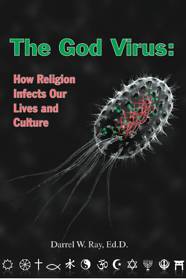Diagnosing The God Virus
Author Darrel Ray Discusses Newest Book and Upcoming Lecture in Santa Barbara
There is a new, controversial, and awe-inspiring book that is taking the country by storm. The God Virus outlines the consequences of certain religious beliefs from the point of view of psychologist, prominent author, and student of religious studies Darrel Ray. Ray examines the ‘virus’ of theism and how religions often breed prejudice and harmful superstitions. He’ll be coming to Santa Barbara for a lecture on March 20 in the patio room of Vista del Monte, located at 3775 Modoc Road, at the request of the Humanist Society of Santa Barbara. As a student of religious studies myself, I wanted to find out more about this topic, so Dr. Ray agreed to discuss with me his new book earlier this week.

What first inspired you to write The God Virus, and do you think that the book will encourage other authors to step forward in the genre of non-theistic literature?
I wrote The GV because, after reading Dawkins, Harris, Dennet and Hitchens, I felt that none of them gave us a working, practical way to understand religion and live with it in our daily lives. I wanted to give people a framework that had practical and daily value to the reader, not just a good argument against gods and religion. I think I accomplished my goal to some degree because the feedback I consistently get from readers says, “Wow, now I understand my mother-in-law.” Or, “The God Virus really explains why I still feel guilty about sex or eating pork.”
It is a good practical theory that people can put to work in their daily lives, much like knowing arithmetic gives you a theory for managing your daily finances. It explains the behavior of the local priest and the governor of Utah. It guides us in understanding Ted Haggard, the President of the Mormon Church and your fundamentalist sister. To my knowledge, no one has provided this kind of framework in a format that anyone could read and understand.
Let me be clear, my hat is off to Dawkins, Dennett and others. They did a superb job of paving the way, but it was time for a more practical work.
Why did you originally decide to study religion and its effects on society?
I have always been interested in human behavior and what drives it. That is why I took degrees in sociology, anthropology, religion, and psychology. Religious behavior is among the most interesting things to study because it is clear that it has little or no impact on morality, yet people cling to it so strongly. I wanted to answer the question, “If religion has no effect on morality, what purpose does it serve?” Even the fundamentalists’ own researcher (George Barna) shows that divorce rates are higher and other so called “immoral” behavior is greater among religious people.
I could see in my early years the amazing ability of religious people to behave immorally while justifying their behavior through their religion. My grandmother and grandfather were among the most devout and religious people I knew when growing up, yet their racism and hatred of anyone who disagreed with their religious views was obvious to me from an early age. Amazingly, no one else seemed to notice it. They were held up as the models for the community where they lived.
I can’t tell you how many preachers in our denomination got caught committing adultery, some multiple times, yet the denomination seemed to find a way to forgive them. Look at the sex scandals of the Catholic Church. Immorality is rampant among clergy, but they don’t seem to see it until a policeman or lawyer point it out to them.
It seemed that if religion was so powerful in guiding morality, those with the most training should be the least susceptible to temptation. Looking at it through the lens of the god virus, explains much more about the behavior of priests, ministers, imams, and elders than any theological theory about sin and temptation. That is why I speak and write about religion. I want everyone to be able to identify the common manipulations that all religions use to infect people. From music techniques to hypnotic methods, sexual guilt training to trance induction techniques in prayer: All religions use a common set of tools to infect people. Once you understand this, it becomes quite easy to spot the manipulation and counter it in your own life, and maybe understand what is going on in the lives of others.
In your biography I see that, similarly to myself and many others, you were raised in a religious household. How did that affect your life and career?
It was great training for writing The God Virus. Almost all my relatives are deeply infected. There are several ministers, many Sunday school teachers, and a few missionaries. My parents even became missionaries when they retired. Interestingly, none of my siblings are the least bit religious.
I really wanted to believe when I was younger. I did everything from participate in bible contests to teach Sunday School and work as a camp counselor. I even took an MA in Church and Community. Shining the light of reason and education on the questions of religion eventually demonstrated to me that it was all a shell game. But the education and experience was worth it. There aren’t many religious people who know their religion or religious books as well as I do.
Who do you hope to reach with The God Virus and subsequent speaking tour?
I wrote the GV to the non-theist audience because it seemed to me that there was not a good framework for them to use in dealing with the religious world. Many non-theists are angry and frustrated with the religious people they have to deal with every day, but they don’t understand religious behavior and why people believe in invisible friends so adamantly. With understanding comes some compassion and maybe the opportunity to influence or live more productively with the religious people in our lives.

Given the framework, I felt that people might be able to have a more constructive dialogue. To my surprise, many theists have read the book as well! They don’t necessarily agree with everything, but they often write me to say they have a whole new perspective on their own religious indoctrination and understand their behavior and that of others better. A few have even said that reading the book helped them escape their delusions and to do a rational analysis of their early childhood indoctrination.
What one sentence best describes the message you hope to convey in Santa Barbara on March 20?
Not sure I can do that in one sentence! That religious infection generally comes at an early age. If you don’t get infected early, you have a good chance of never getting infected. That is why religions work so hard to infect you with their particular god virus, so you will stay with them for a lifetime. Each religion teaches its unique guilt message. Guilt keeps you tied to a particular religion because you learned the guilt in that religion. Baptists don’t go to Catholic confession, Moslems don’t read the bible to get rid of their guilt, and Mormons don’t ask Scientologist readers for advice. You have to come back to the god virus you were infected with to deal with the guilt that it taught you in the first place. It is the perfect con game.
I explore guilt and sexuality at some length in the book because they are so important to all major god viruses. If guilt and sexuality were taken away as tools, most religions would crumble. They are very powerful tools and religions use them quite effectively. The evidence can be seen in the degree to which fundamentalists use them and how much less they are used by the “liberal religions.” The “liberal religions” are losing the battle for membership because they have lost the ability to use sex and guilt effectively. I think this is the key to understanding the power of Islam and Christian fundamentalists. Their use of sexual control and guilt allow them to focus a lot of energy on infecting others with their parasitic virus. I could talk all day about this, but you will hear a more coherent approach in my talk on Saturday. In many ways, sex is the key to understanding a lot of religious behavior.
I hear you have started an organization for those leaving religion. Please elaborate.
Yes, my research and experience showed that there are a lot of social, emotional, and psychological consequences for people who leave any religion. I started Recovering from Religion (see www.recoveringreligionists.com ) as a way to support people who are leaving. There are lots of groups trying to get you into religion, ours is the only one helping you get out. We call it “Learning the Joy of Faith Free Living.” We now have groups all over the country. They meet monthly and discuss everything from marriage and family issues to work and social issues. How do you deal with telling your family you no longer believe? How do you work with a religious boss and keep your job? How do I deal with the guilt I learned in religion? It also gives the newly non-religious a place to interact with others going through the same thing. We have ex-Mormons, ex-Baptists, ex-Catholics, even an ex- Moonie in our groups. It is quite revealing to listen to such a collection of people all in one room. Their stories sound so much alike on many levels. It shows how the god virus works across all religions.
4•1•1
Darrel Ray will discuss The God Virus on Saturday, March 20, 2:30 p.m., in the patio room of Vista del Monte, 3775 Modoc Road. The event is being put on by the Humanist Society of Santa Barbara. See santabarbarahumanists.org and thegodvirus.net for more info.



